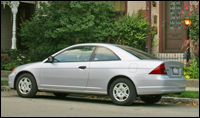Dear Umbra,
I have a question that has been nagging me for a while, and I would really like to have it answered once and for all. You see, I deliver pizzas for a living right now, and so I make many frequent stops and starts at people’s houses during a shift. I always turn off my engine whenever I make a delivery or am waiting at the store for the next order to come up, because I believe in doing my part to keep our air clean and reduce greenhouse-gas emissions. But I keep hearing the argument that turning your car on and off actually wastes more fuel than if you were to just leave it running, because your engine burns more fuel when you first start it. What should I do?
Matthew
Kitchener, Ontario, Canada
Dearest Matthew,

Yes, turn off the engine!
You’ve been doing the right thing. I have it confirmed from the U.S. EPA National Vehicle and Fuel Emissions Laboratory and the California Air Resources Board. There are tests that compare emissions over minute-long increments for restarted versus idled cars. I’ve seen the numbers for smog-forming nitrous oxide, poisonous carbon monoxide, chunky particulate matter, and volatile organic compounds. Idling produces more emissions. Over nine minutes, for example, an idling car will emit double the pollutants of a car that is turned off and then restarted. Of course, it depends on the car you’re driving and other variables, but you can feel confident turning off your engine, unless you’re the speediest pizza guy on the planet. If the delivery takes any longer than 60 seconds, you’re doing everyone a clear favor.
I did uncover a smoking tailpipe while confirming your excellent habits: A recently stopped engine continues to heat fuel and exude polluting gases. Zoinks. The idea that a still engine does no harm is a false impression generated by the use of the word “off” and the lack of noise under the hood. The hot engine, a hot day, hot pavement — all produce what are called “evaporative soak emissions.” Evaporative soak is the engine after-party, and any evaluation of whether it’s better to turn your car off or leave it idling must take evaporative soak into account.
You’re still doing the right thing by turning your car off, but now you can sound even more knowledgeable when gently correcting those who disagree. Plus, as my Latin teacher said, arcane knowledge is always useful at cocktail parties. Gallia est omnis divisa in partes tres, you know.
Noxily,
Umbra

